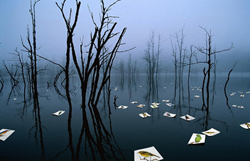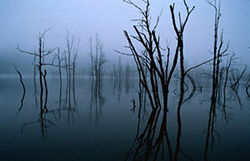Life and Leisure
Snapper accused of plagiarism
By Cheng Yingqi (China Daily)
Updated: 2010-08-10 12:48
 |
Large Medium Small |
|
 |
 |
|
A photo titled Tomorrow's Reality (left), which won a gold prize in the 2010 National Photographic Art Exhibition, is suspected of being plagiarized from an unnamed photo (right), which appeared in a photo bank published 10 years ago. Provided to China Daily | |
BEIJING - A top prize winner in China's 2010 National Photographic Art Exhibition has been accused of plagiarizing work from a photo bank published 10 years ago.
Judges for the 2010 exhibition had selected 15 gold prize winners from the 15,114 photographs submitted to the China Photographers Association (CPA).
Chen Lianjun, a member of the Jiangsu branch of the CPA, reportedly found the plagiarism on Saturday.
Working as an executive in an advertising company, Chen asked his employees to look over a collection of award-winning works from the exhibition, which were printed in the Chinese Photography magazine.
"A company clerk named Yang Jiahui told me he had seen one of the winning photos in an old album around the office. He then showed me a photo on page 52 of the album, which was a flipped version of the winning photo," Chen was quoted by the Yangtze Evening News as having said.
Chen had bought the picture album, which included a CD of the photo bank, nearly 10 years ago. The book did not list the name of the photographer who shot the photo that was allegedly plagiarized.
Chen compared the origina
l shot in the photo bank with the prize-winning photo, which was shot by Hou Xie, of Hunan province. He then put them online to draw attention to the similarity, which aroused nationwide attention.
CPA staffer Deng Pengcheng told China Daily on Monday that the exhibition organizing committee had heard about the scandal and had launched an investigation.
An ever-increasing number of candidates and developing computer techniques had "presented new challenges" to the CPA, Deng said.
As the work was entered in the "art photography" category, the photographer was allowed to use computer-enhanced technology, such as Photoshop software, to produce the desired effect, said Qiao Xiaobing, an expert with the CPA.
In art photography, the photographer "can use any existing materials to create new artistic effects, according to international conventions", Qiao said.
"Although it is not proper to use such a picture in the competition, the pattern of manifestation is not against the law," Qiao said.
This is not the first case of plagiarism reported in photography circles.
In January, four scenic photos that won the Golden Medal Award, the highest award for Chinese photographers, were proven to have been plagiarized. Sang Yuzhu, the award winner and vice-president of the photography association within the Jilin Artists' Association, was stripped of his post with the CPA.
China Daily